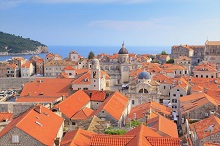Exploring the Language of the East European Country Croatia and Croatian Translation
October 31, 2016

Hello, I am Yosshi. I entered the translating business two years ago, dreaming of an international career. Since then, every day I keep discovering more about the ever-fascinating world of translation.
When it comes to popular tourist destinations in Europe, countries like Italy, France, and Spain immediately come to mind. However, in recent years, Croatia has been attracting the attention of the tourism industry as a niche destination in East Europe. So, I decided to do a little research on Croatia and Croatian translation.
Occupation, Civil War, Independence... And now, a Popular Tourist Destination in the Making!
First, I looked into the basic facts on Croatia, such as its geographic location, history, and current situation.
Croatia is situated west of Italy, bordering the Adriatic Sea, and makes up part of the Balkan Peninsula. After World War I, this region became Yugoslavia, but conflict broke out between the different ethnic groups within the state. It finally achieved independence as a result of a war with Serbia, but its history has been fraught with painful occupation and conflicts.
In Croatia, we can still see the scars of civil war here and there, but the country is trying to transform itself into a popular tourist destination with its many tourist attractions like its beaches and streets, as well as its world heritages. As a matter of fact, the number of Japanese tourists visiting Croatia has increased significantly in recent years. Being a country with many tourist attractions still to be discovered, the demand for Croatian translation in making guidebooks and tourist brochures will hopefully increase in the future.
Croatian Alphabet and its Pronunciation
I am the type of person who thinks they should try to communicate with local people in the local language when visiting a foreign country. So, I did a little research on the Croatian alphabet and its pronunciation. The Croatian alphabet is quite similar to the English one, and the way it is read is generally straight-forward. However, you need to be careful because there are also letters that do not exist in English. For example, there are three types of "C"s, which are distinguished as [c], [č], and [ć]. In terms of pronunciation also, there are cases where the letter is pronounced differently than in English, like "čaj" pronounced "chai" (meaning "tea") and "stanica" pronounced "stanitza" (meaning "station").
During a trip, the less accustomed Japanese people are to the language, the more likely they are to speak it in a Japanese pronunciation that is reliant on katakana pronunciation guides. In tourist guidebooks, there are many proper nouns like the names of tourist spots, so it is important to print katakana that corresponds accurately to the correct Croatian pronunciation of the noun.
Proper Nouns with Six Different Forms
After looking into the Croatian alphabet and pronunciation, I read about its grammar, and was interested in case inflection. First of all, Croatian verbs can be in either perfect tense or non-perfect tense, and the end of the verb is conjugated according to the grammatical subject. Which makes it difficult to look up words in a dictionary, doesn't it? Furthermore, what surprised me the most was that even proper nouns are subject to inflection! And they actually change in six forms, depending on whether you use them as subject, direct object, or for some other function. For example, the proper noun "Osaka" can become "Osaki" or "Osaku"! Even people's names can change, so if you don't know this rule, you might misinterpret one name as representing multiple people.
Croatia, with its beautiful and abundant tourism resources, has recently caught the eye of the tourism industry, and is steadily growing and trying to strengthen its tourism sector. I myself, after looking into Croatia, have begun to think of visiting there someday. Personally, I will be keeping an eye on Croatia as my next vacation spot, as well as my potential area of translation!
Related Services
| << Jasmine: The Tragic Romantic Story Hidden Behind the Philippines' Floral Emblem | The Baltic Tiger―Estonia: Its Innovations and Language >> |
To Contact Us Regarding Our Translation Services
For urgent needs, call:
+81-3-5730-6133
